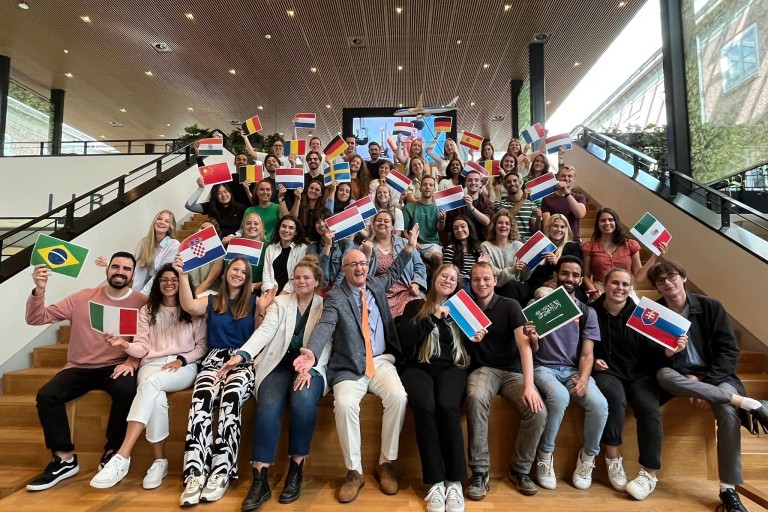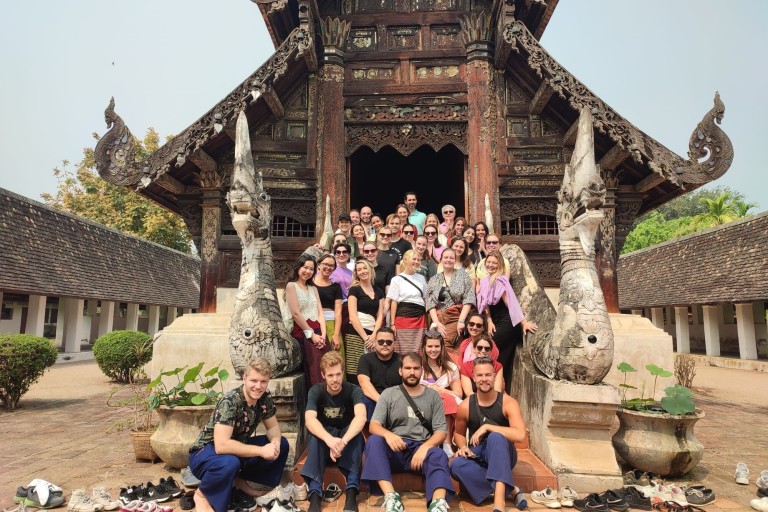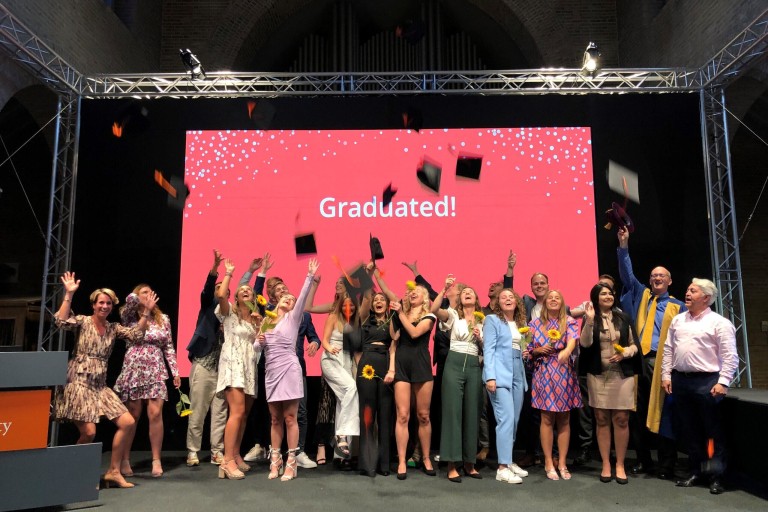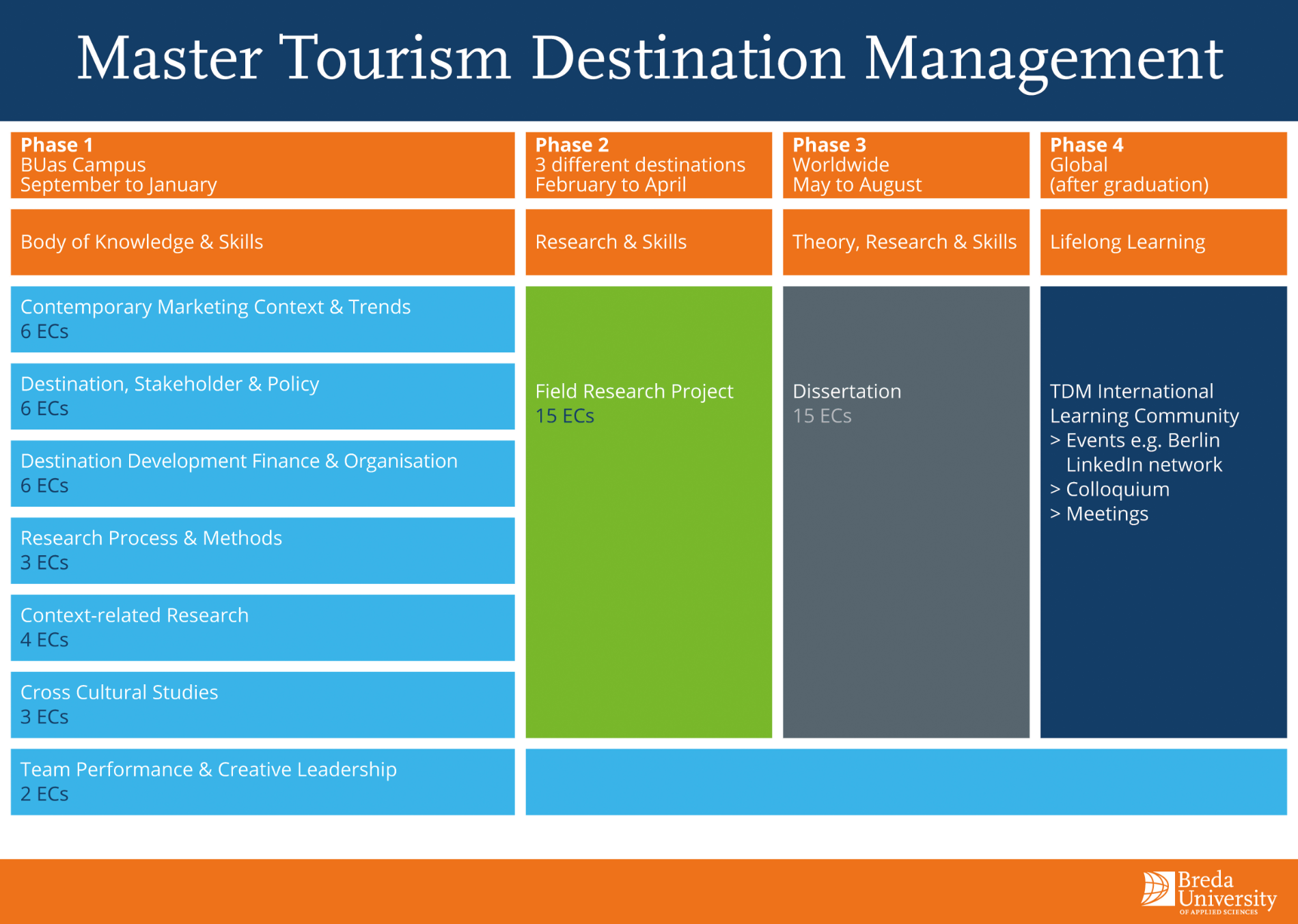Come and meet us
Walking around on campus is the best way to truly experience BUas. Sign up for one of the upcoming events or activities.
Course content
Tourism is a fast-growing and dynamic sector that offers many opportunities for study and research. The tourism sector brings economic benefits, growth and opportunities for people and businesses in destination areas. At the same time, it remains a challenge to match supply and demand effectively. Effective management of these kinds of changes and building resilient businesses and destinations requires knowledge and expertise that is closely intertwined with the destinations themselves.
This master's programme starts in Breda, with an emphasis on theory. After that, you will visit three different tourist destinations. The focus is on tourism in practice under various circumstances, and you will work in international research teams of students.
In the final phase, you will write a thesis in which you combine practice and theory and try to develop new insights.
The programme lasts 12 months and consists of three phases:
- Phase 1 – Theory in Breda
In the first phase (five months), you will learn the necessary theory and develop professional skills. This will enable you to properly analyse the current situation and development opportunities of tourist destinations. You will study destination theories, models, trends and case studies, and you will do individual assignments.
The first phase covers the following subjects:
- Destination Stakeholders and Policy (6 ECTS credits)
- Contemporary Marketing, Context and Trends (6 ECTS credits)
- Destination Development, Finance and Organisation (6 ECTS credits)
- Context Related Research (4 ECTS credits)
- Cross Cultural Studies (3 ECTS credits)
- Research Process & Methods (3 ECTS credits)
- Team Performance and Creative Leadership (2 ECTS credits)
Below you will find some subjects explained:
- In Destination Development, Finance and Organisation you will learn about the economic impact of tourism, how projects and events in the sector are financed, and how project management works.
- In Team Performance and Creative Leadership you will learn how to best communicate across cultures. You will learn how to use skills and tools in a team, understand group dynamics, and act accordingly.
- In Destination Stakeholders and Policy you will learn how to map out the relationships and interests of various stakeholders. You will delve into their dilemmas and how they relate to current developments in tourism. Ultimately, you will develop a tourism vision and a master plan.
- Phase 2 – Field research
In the second phase (three months), you will work on assignments at three destinations worldwide, each of which is in a different stage of development. The assignments are created by lecturers and stakeholders involved in the specific area, and each team works from a different (stakeholder) perspective. You will gain the intercultural experience needed to effectively research the future of the area with your team.
We select destinations that are dynamic, have good contacts with businesses and government authorities, and offer cultural diversity. The final destinations are determined after the start of the programme. Previous destinations have included Australia, Thailand, Malaysia, Sri Lanka, Cambodia, Indonesia, Chambéry (France), Malta and Singapore. You will travel with your class to these three destinations, where you will stay for approximately one month. The lecturers will put together the project groups, and you will arrange your own accommodation with your group.
- Phase 3 – Final thesis
Your thesis demonstrates your research skills and insight into Tourism Destination Management, both professionally and academically. It is an individual assignment, supervised by one of our lecturers.
Which topic will you choose? Writing a thesis takes time and energy, so it helps if you are motivated and interested in your topic. Getting new ideas while writing? Lecturers are always available to discuss them with you. In phase 1 of the master's programme, you will already come up with a topic and start your research proposal. Your thesis must have an international tourism topic and be written in English, unless another language is more appropriate. Some recent thesis examples are:
- Strengthening Bridges – how a Dutch tour operator can improve collaboration with its Indonesian partners
- Development and Application of Smart City Practices in Rural Destinations – how can regenerative tourism possibly occur?
- Experiences and motives behind tourists’ choices of destinations with paranormal activity – a case study of Hoia Baciu Forest, Romania.
- More examples can be found here.
Cooperation with an external client
You can write your thesis for an external client, such as an industry partner of BUas, or for an international tourism organisation of your choice. This gives your research a practical, professional dimension. You can also tailor your research to one of the research theme and professorships within BUas. Many students choose to conduct independent research and travel to a tourist destination to explore and further develop their topic.Where will you work on your thesis?
During this final phase of your master's programme, you can work on your research and thesis anywhere in the world. The oral final exam will take place in the Netherlands. The majority of students graduate at the end of August, making this a full-time 12-month programme.
We offer a small-scale, international study environment with 30 to 50 students per year, approximately 50% of whom are international. You will start with one class and split up for workshops and group work in phase 1.
In phase 2, you will work in small groups under the supervision of two supervisors, partly on location and partly online. At the end of each destination, you will submit a report and give a group presentation.
In phase 3, you will work independently and receive online guidance and feedback from your supervisor. Your final product will be a thesis and an oral defence.
There are no interim examinations. You earn credits by creating portfolios, writing reports and giving presentations. Sometimes you will visit a company or be given an assignment on site.
The professional master’s programme in Tourism Destination Management is a one-year, full-time programme consisting of 40 hours per week, with a total study load of 60 ECTS credits. One ECTS credits equals about 28 study hours per week. The programme lasts 12 months, from the end of August to the end of August the following year.
You will be in daily contact with lecturers, guest lecturers, academics and professionals from the tourism sector. The operations manager is also always available to help you with day-to-day matters.
- A typical week
Every week is organised differently. The number of days with classes varies from week to week. Below is an example of an average week.
Monday
- 09:30-10:30 Introduction lecture on CCS (Cross-Cultural Studies)
- 11:00-12:00 Guest lecture on CRR (Context-Related Research)
- 12:00-12:30 Lunch
- 12:30-14:30 Working on group assignments with classmates*
- 14:30-16:00 Workshop on CMCT (Contemporary Marketing Context and Trends)
Tuesday
- 14:00-15:00 Lecture on CRR (Context-Related Research)
- 15:00-17:00 Consultation session on CMCT (Contemporary Marketing Context and Trends)
Wednesday
- 9:30-11:30 Workshop on CCS (Cross-Cultural Studies)
- 11:30-13:30 Seminar on CMCT
- 13:30-14:00 Lunch
- 14:00-15:00 Lecture on CCR (Context-Related Research)
- 17:00-19:00 Monthly master’s drinks on campus together with the students of other BUas master’s programmes
Thursday
- 9:30-12:00 Presentations on CMCT (Contemporary Marketing Context and Trends)
- 12:00-13:00 Lunch and free time
- 13:30-15:30 Guest lecture (Context-Related Research)
- 15:30-17:00 Working on group assignments with classmates*
Friday
Working on assignments from home*These times are scheduled by the students themselves; you are free to decide with your group when to work on your assignment.
Student well-being
BUas encourages and helps you to make the most of yourself, whatever your circumstances. Maybe you have a chronic illness, are a family carer, a competitive athlete, or juggle your studies with running your own business? Our study coaches, student counsellors and student psychologists are here to help. Do you need extra support or advice? Or extra facilities? Then take a look at the options here.
During this master’s, you will regularly receive guest lectures from industry professionals. Some examples from previous years are:
- Dr Andrew Mzembe about sustainable innovation management in tourism
- George Arbuckle about aviation and sustainability
- Prof. Claudio Milano about urban tourism and (im)possibilities in times of crisis
During phase 1, you will spend a day on location for some courses, for example doing research in Amsterdam. In addition, for the Destination Stakeholders and Policy course, you will spend two days visiting various companies in Rotterdam.
For this professional (hbo) master's programme, you will study in the Netherlands and at three different locations worldwide. This will allow you to gain a lot of intercultural experience and learn a great deal about tourist destinations in various stages of development. Previous destinations have included Australia, Thailand, Malaysia, Sri Lanka, Cambodia, Indonesia, Chambéry (France), Malta and Singapore.
The master’s programme in Tourism Destination Management offers three different tracks. In addition to Tourism Destination Management, you can also choose two other master's specialisations.
In Tourism and Hospitality Innovations, you will focus on sustainable outdoor hospitality management and prepare yourself for a future as an entrepreneur or manager in the outdoor hospitality industry. A multiple degree programme in Breda, Girona and Rijeka.
Urban Tourism and Mobility focuses on urban tourism and urban planning, the challenges of overtourism and congestion, urban placemaking, and urban and interurban sustainable mobility choices. Start in Breda, followed by 3 months of field research in European cities.
If you have any questions about the different specialisations or how to apply for one of them, please contact us at [email protected].
At BUas, you develop your entrepreneurial skills in all programmes. You can also join BUas Startup Support (BUSS), where you attend networking meetings and receive guidance from a startup coach.
Would you like to graduate with your own company? You can do that at any academy, although a selection procedure may apply. Whether you are already generating revenue or just have an initial idea, BUas Startup Support will help you.
Read more about starting your own business.
What makes this study programme unique
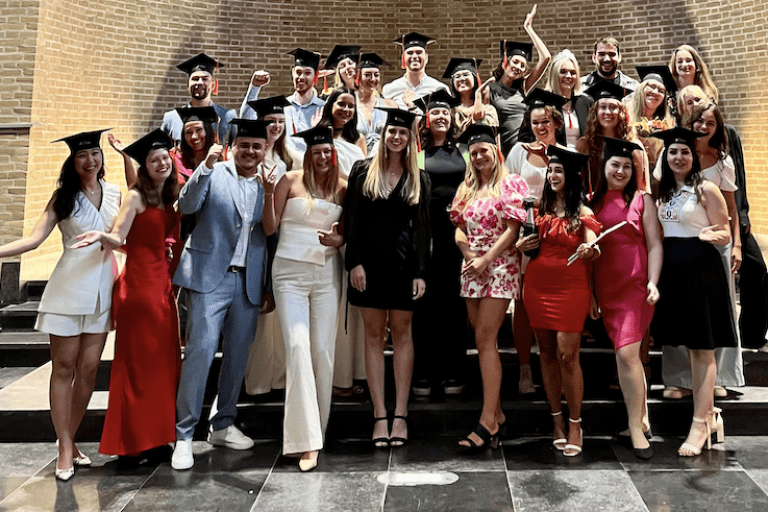
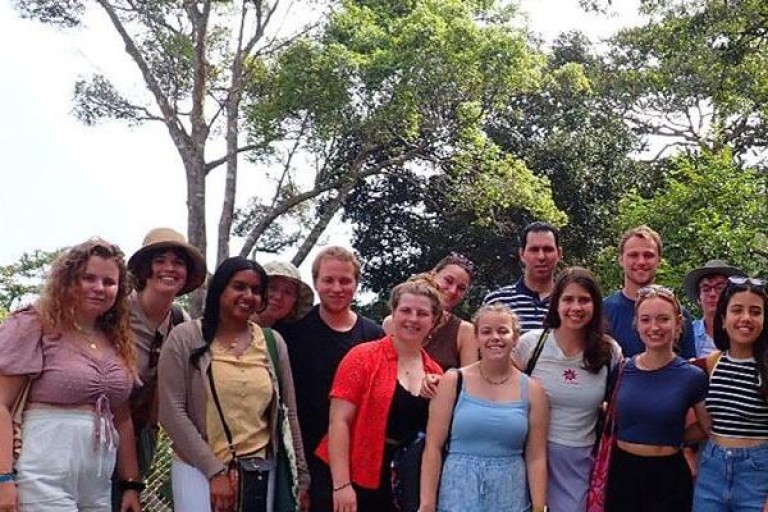
Greetings from Penang!
Students went to Penang in phase 2 to conduct research
Admission & application
What are the admission requirements?
Students are eligible if they hold a bachelor’s degree (BA, BSc., BBA, B Com), for example in the fields of tourism, hotel management, international business, management, economics, law, e-commerce, urban development, geography, social sciences or finance. If you do not meet these requirements, you can have a look at the options available to you.
Information about admission requirements
What does this study programme cost?
For academic year 2025-2026 the statutory tuition fee for master's programmes is €2,601. In addition, you should take extra costs for software, excursions, etc. into account.
How can I apply?
If you meet the admission requirements, you can apply for this study programme. You can apply until 15 August, but you are encouraged to apply before 1 July because of the summer holidays.
Find out if this study programme suits you
Seeking a master’s programme in tourism, leisure, or imagineering? Take this short quiz to discover the best match for you.

What others say about this programme
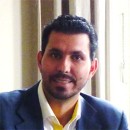
Learn, grow and reach milestones

Maximising the positives, minimising the negatives
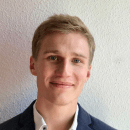
You learn to use your talents better
What can you do after your studies?
Graduates of the Master Tourism Destination Management are entitled to the degree of Master of Arts and qualified for international policy and advisory positions, international management positions and research positions.
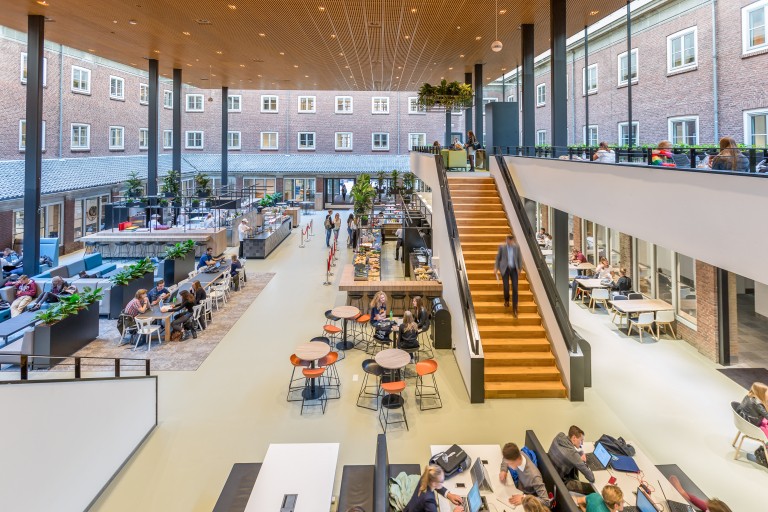
Virtual campus tour
Have a virtual look and discover the Horizon building where you’ll be studying and what more the campus has to offer.

Get inspired!
Read more about projects, research and insights in the field of Tourism.
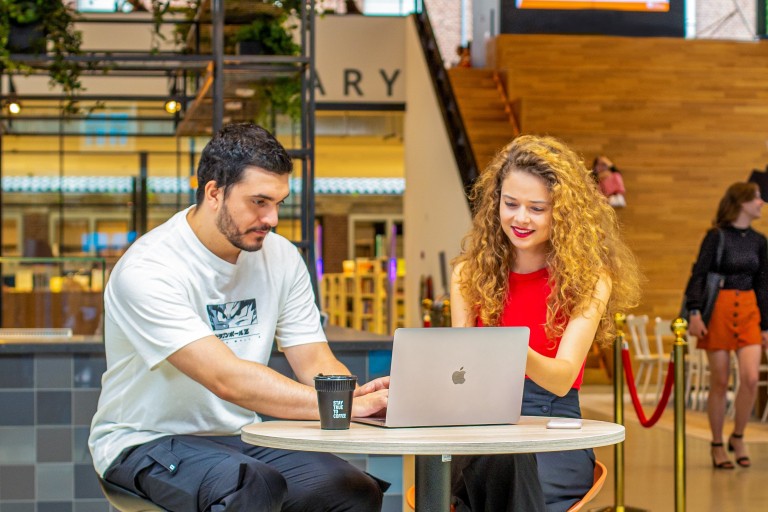
Help with choosing your study programme
Do you want to continue after your bachelor's or further develop your professional skills and are you looking for a master's? Discover, compare and choose your master's programme at BUas.

